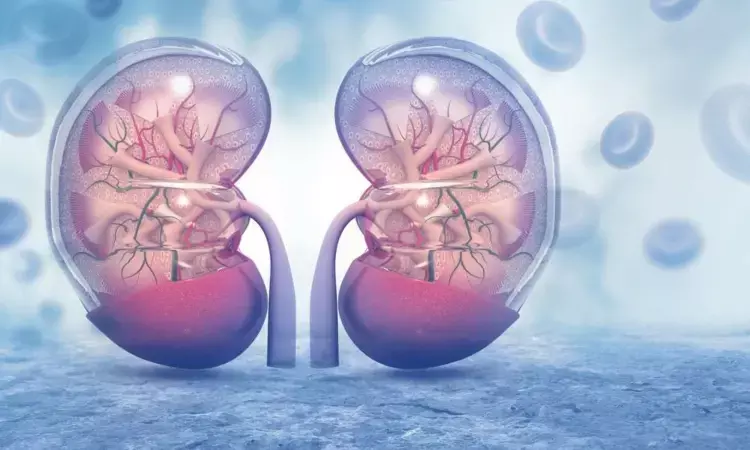- Home
- Medical news & Guidelines
- Anesthesiology
- Cardiology and CTVS
- Critical Care
- Dentistry
- Dermatology
- Diabetes and Endocrinology
- ENT
- Gastroenterology
- Medicine
- Nephrology
- Neurology
- Obstretics-Gynaecology
- Oncology
- Ophthalmology
- Orthopaedics
- Pediatrics-Neonatology
- Psychiatry
- Pulmonology
- Radiology
- Surgery
- Urology
- Laboratory Medicine
- Diet
- Nursing
- Paramedical
- Physiotherapy
- Health news
- Fact Check
- Bone Health Fact Check
- Brain Health Fact Check
- Cancer Related Fact Check
- Child Care Fact Check
- Dental and oral health fact check
- Diabetes and metabolic health fact check
- Diet and Nutrition Fact Check
- Eye and ENT Care Fact Check
- Fitness fact check
- Gut health fact check
- Heart health fact check
- Kidney health fact check
- Medical education fact check
- Men's health fact check
- Respiratory fact check
- Skin and hair care fact check
- Vaccine and Immunization fact check
- Women's health fact check
- AYUSH
- State News
- Andaman and Nicobar Islands
- Andhra Pradesh
- Arunachal Pradesh
- Assam
- Bihar
- Chandigarh
- Chattisgarh
- Dadra and Nagar Haveli
- Daman and Diu
- Delhi
- Goa
- Gujarat
- Haryana
- Himachal Pradesh
- Jammu & Kashmir
- Jharkhand
- Karnataka
- Kerala
- Ladakh
- Lakshadweep
- Madhya Pradesh
- Maharashtra
- Manipur
- Meghalaya
- Mizoram
- Nagaland
- Odisha
- Puducherry
- Punjab
- Rajasthan
- Sikkim
- Tamil Nadu
- Telangana
- Tripura
- Uttar Pradesh
- Uttrakhand
- West Bengal
- Medical Education
- Industry
AI linked to promising outcomes in early detection of acute kidney injury

A recent review conducted by Hanfei Zhang and team shows the potential of artificial intelligence for early acute kidney injury (AKI) prediction during surgery. The findings of this study were published in BMC Nephrology.
In a variety of surgical scenarios, acute kidney damage is independently linked to morbidity and death. Artificial intelligence is now being utilized more and more to enhance perioperative AKI early diagnosis and management due to the growing usage of electronic health records (EHR), improvements in patient information retrieval, and cost savings in clinical informatics. However, there isn't a quantitative analysis of how well these strategies function. In order to determine the sensitivity and specificity of artificial intelligence for the forecasting of acute kidney damage during the perioperative phase, this systematic review and meta-analysis was carried out.
Up till October 2, 2021, Embase, Pubmed, and Cochrane Library were searched. Studies demonstrating the early diagnosis of perioperative acute renal damage using artificial intelligence were considered. To aggregate specificity and sensitivity with 95% CIs, true positives, false positives, true negatives, and false negatives were combined. The findings were displayed in forest plots. The PROBAST method was used to evaluate the risk of bias in the qualifying studies.
The key findings of this study were:
1. There were 304,076 patients in 19 trials total.
2. The Rutter and Gatsonis hierarchical summary receiver operating characteristics (HSROC) model was used to perform a quantitative random-effects meta-analysis.
3. The results showed that the diagnostic odds ratio, pooled sensitivity, and specificity were all 0.77 (95% CI: 0.73 to 0.81), 0.75 (95% CI: 0.71 to 0.80), and 10.7 (95% CI: 8.5 to 13.5), respectively.
4. There was no proof of publishing bias, and the threshold effect was discovered to be the only source of heterogeneity.
In conclusion, none of the pre-specified subgroups had an effect on the predicted accuracy, according to this study. It was argued that without technical innovation, the advancement of artificial intelligence may have reached a plateau, making it challenging to further optimize forecast accuracy using current techniques.
Reference:
Zhang, H., Wang, A. Y., Wu, S., Ngo, J., Feng, Y., He, X., Zhang, Y., Wu, X., & Hong, D. (2022). Artificial intelligence for the prediction of acute kidney injury during the perioperative period: systematic review and Meta-analysis of diagnostic test accuracy. In BMC Nephrology (Vol. 23, Issue 1). Springer Science and Business Media LLC. https://doi.org/10.1186/s12882-022-03025-w
Neuroscience Masters graduate
Jacinthlyn Sylvia, a Neuroscience Master's graduate from Chennai has worked extensively in deciphering the neurobiology of cognition and motor control in aging. She also has spread-out exposure to Neurosurgery from her Bachelor’s. She is currently involved in active Neuro-Oncology research. She is an upcoming neuroscientist with a fiery passion for writing. Her news cover at Medical Dialogues feature recent discoveries and updates from the healthcare and biomedical research fields. She can be reached at editorial@medicaldialogues.in
Dr Kamal Kant Kohli-MBBS, DTCD- a chest specialist with more than 30 years of practice and a flair for writing clinical articles, Dr Kamal Kant Kohli joined Medical Dialogues as a Chief Editor of Medical News. Besides writing articles, as an editor, he proofreads and verifies all the medical content published on Medical Dialogues including those coming from journals, studies,medical conferences,guidelines etc. Email: drkohli@medicaldialogues.in. Contact no. 011-43720751


